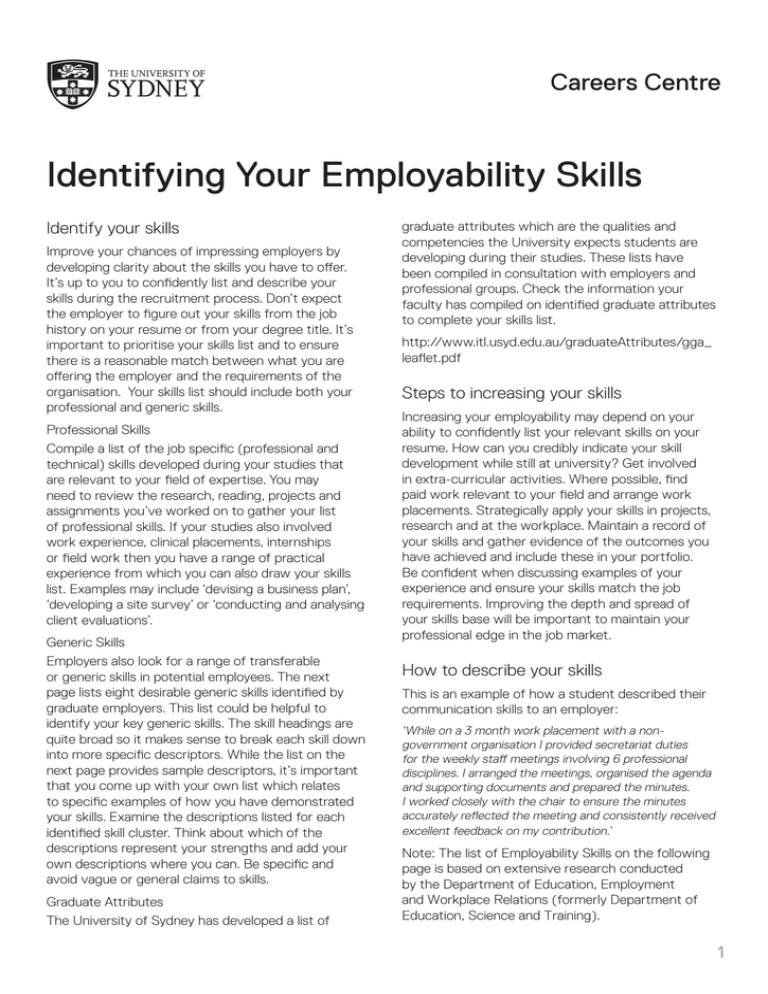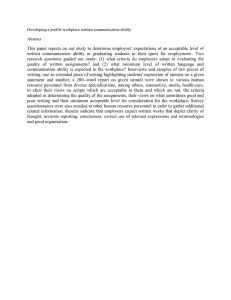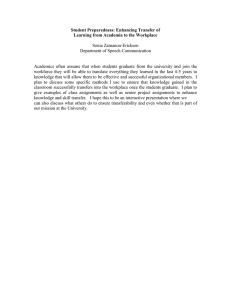Identifying Your Employability Skills
advertisement

Careers Centre Identifying Your Employability Skills Identify your skills Improve your chances of impressing employers by developing clarity about the skills you have to offer. It’s up to you to confidently list and describe your skills during the recruitment process. Don’t expect the employer to figure out your skills from the job history on your resume or from your degree title. It’s important to prioritise your skills list and to ensure there is a reasonable match between what you are offering the employer and the requirements of the organisation. Your skills list should include both your professional and generic skills. Professional Skills Compile a list of the job specific (professional and technical) skills developed during your studies that are relevant to your field of expertise. You may need to review the research, reading, projects and assignments you’ve worked on to gather your list of professional skills. If your studies also involved work experience, clinical placements, internships or field work then you have a range of practical experience from which you can also draw your skills list. Examples may include ‘devising a business plan’, ‘developing a site survey’ or ‘conducting and analysing client evaluations’. Generic Skills Employers also look for a range of transferable or generic skills in potential employees. The next page lists eight desirable generic skills identified by graduate employers. This list could be helpful to identify your key generic skills. The skill headings are quite broad so it makes sense to break each skill down into more specific descriptors. While the list on the next page provides sample descriptors, it’s important that you come up with your own list which relates to specific examples of how you have demonstrated your skills. Examine the descriptions listed for each identified skill cluster. Think about which of the descriptions represent your strengths and add your own descriptions where you can. Be specific and avoid vague or general claims to skills. Graduate Attributes The University of Sydney has developed a list of graduate attributes which are the qualities and competencies the University expects students are developing during their studies. These lists have been compiled in consultation with employers and professional groups. Check the information your faculty has compiled on identified graduate attributes to complete your skills list. http://www.itl.usyd.edu.au/graduateAttributes/gga_ leaflet.pdf Steps to increasing your skills Increasing your employability may depend on your ability to confidently list your relevant skills on your resume. How can you credibly indicate your skill development while still at university? Get involved in extra-curricular activities. Where possible, find paid work relevant to your field and arrange work placements. Strategically apply your skills in projects, research and at the workplace. Maintain a record of your skills and gather evidence of the outcomes you have achieved and include these in your portfolio. Be confident when discussing examples of your experience and ensure your skills match the job requirements. Improving the depth and spread of your skills base will be important to maintain your professional edge in the job market. How to describe your skills This is an example of how a student described their communication skills to an employer: ‘While on a 3 month work placement with a nongovernment organisation I provided secretariat duties for the weekly staff meetings involving 6 professional disciplines. I arranged the meetings, organised the agenda and supporting documents and prepared the minutes. I worked closely with the chair to ensure the minutes accurately reflected the meeting and consistently received excellent feedback on my contribution.’ Note: The list of Employability Skills on the following page is based on extensive research conducted by the Department of Education, Employment and Workplace Relations (formerly Department of Education, Science and Training). 1 Communication Skills Planning & Organising Skills • Listening, understanding and speaking clearly • Establishing clear & attainable project goals & deliverables • Writing appropriately for different audiences • Defining specifications & quality standards • Persuading & negotiating effectively • Demonstrating empathy, assertiveness & tact • Planning the use of resources including time, people, finances & materials • Understanding the needs of customers/clients • Risk management & contingency planning • Establishing relationships & using networks • Managing time & priorities – setting milestones • Sharing information & proposing ideas • Managing tasks - delegating, coordinating, monitoring • Fluency in English & other languages • Managing people - training, developing, motivating, giving feedback, supervising • Logically summarising information or data • Chairing a meeting Teamwork Skills • Working effectively with people of different ages, gender, race, religion or political persuasion • Identifying the strengths of team members • Recognising own strengths & limitations • Clarifying team roles & performing agreed tasks • Demonstrating leadership as appropriate • Coaching, mentoring & motivating others • Giving & receiving constructive feedback • Resolving differences of opinion • Collaborating & contributing to team results Problem Solving Skills • Collecting, analysing & organising information • Being resourceful, taking initiative & making decisions • Establishing evaluation criteria & participating in continuous improvement • Reporting on progress & outcomes • Understanding basic business systems & their relationships Learning Skills • Managing own learning • Sharing knowledge & experience in the workplace • Contributing to the learning community at the workplace • Using a range of mediums to learn – mentoring, peer support, networking, information technology (IT), courses • Applying learning to ‘technical’ issues e.g. learning about products & ‘people’ issues e.g. interpersonal and cultural aspects of work • Analysing facts & testing assumptions • Having enthusiasm for ongoing learning • Defining the problem & contributing factors • Being willing to learn in any setting – on & off the job • Developing creative, innovative &/or practical solutions • Being open to new ideas & techniques • Showing initiative in identifying & solving problems • Being prepared to invest time & effort in learning new skills • Solving problems independently & in teams • Acknowledging the need to learn in order to accommodate change • Applying a range of strategies to problem solving • Designing contingencies • Developing & evaluating a range of options Technology Skills • Making realistic decisions & action plans • Having a range of basic IT skills • Using mathematics including budgeting & financial management to solve problems • Applying IT as a management tool • Resolving customer concerns in relation to complex issues • Being willing to learn new IT skills • Implementing & monitoring solutions • Having the occupational health and safety knowledge to apply technology • Evaluating processes & outcomes • Using IT to organise data • Having the appropriate physical capacity Initiative & Enterprise Skills • Identifying opportunities not obvious to others Self Management Skills • Assessing the competitive advantage of ideas • Having a personal vision & goals • Identifying customer or client requirements • Evaluating & monitoring own performance • Developing strategic goals • Having knowledge & confidence in own ideas & vision • Being creative, initiating ideas & innovative solutions • Articulating own ideas & vision • Determining the commercial viability of ideas • Taking responsibility • Translating ideas into action • Working ethically • Demonstrating political, commercial, environmental, cultural, etc sensitivities • Working under pressure • Liaising with stakeholders & sponsors • Demonstrating resilience • Using a range of business communication methods • Marketing & selling a product or service The University of Sydney Careers Centre Level 5, Jane Foss Russell Building (G02), 160 City Road, Darlington NSW 2006 CRICOS Provider No. 00026A T: +61 2 8627 8403 | F: +61 2 8627 8477 E: careers.information@sydney.edu.au sydney.edu.au/careers 2


